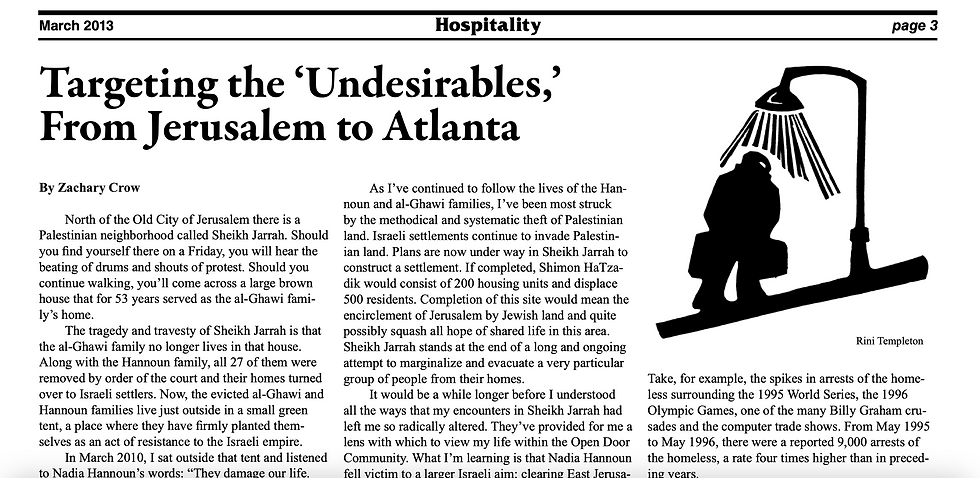Of Hosts, Guests, Gods and Philoxenos
- Zachary Crow
- Aug 31, 2013
- 3 min read
Updated: Feb 19, 2025
Read Online at Open Door's Website
I am a lover of language, particularly etymologies. The Greek word for hospitality is philoxenos, from philo meaning “love” and xenos meaning “stranger.” But what’s perhaps most interesting about the term xenos is that it can also mean “host.” So, in this one word philoxenos, there are actually three concepts all floating around together. Which makes the meaning a bit difficult to pin down. Perhaps it means love for the stranger. Or perhaps it means love from the host. Or maybe even love between the stranger and the host.
In ancient Greece, the practice of extending hospitality was associated with Zeus, the “father of gods and men,” the chief god ruling from the top of Mount Olympus. In fact, he was often referred to as Xenios Zeus, meaning “Zeus the Stranger.” It was believed that Zeus would visit in a stranger’s guise, testing humanity. And, because any stranger could be Zeus, there were many precautions one would take.
First, the stranger was to be provided with water for cleansing the feet. But it’s doubtful that the host would be the one to perform this act. More likely than not, it was done by the guest himself or was the work of a slave. Second, clothing, if needed, was to be offered to the guest. And finally, a meal was to be served. Until all three rituals were enacted and the meal completed, the host was not even allowed to inquire about the guest’s name, home region, or purpose of travel. The next morning, the guest was to be provided with rations for his journey and sometimes a guide to escort him until he had made his way safely out of the area. Occasionally, the stranger and host exchanged gifts, signifying a long-term alliance, and vowed to protect each other whenever one traveled in the other’s region.
In essence, these customs grew out of a desire to neutralize potential threats. Hospitality was about safety, both the stranger’s and the host’s. Strangers traveling in a strange land could easily fall prey to thieves or robbers. Many saw foreigners as threats and sought to mistreat them before they could do the same to the community.
This is seen quite clearly in Genesis 19, when the arrival of strangers results in mob violence
and the rape of Lot’s daughters. Part of Greek hospitality was a vow to provide the foreigner with protection, but this went both ways. It was also believed that by providing hospitality, the host was protecting himself. What if the stranger possessed magical powers of some sort? Or even worse, what if this was one of the gods in disguise? It was commonly held that a showing of abundant generosity might merit their favor. For this reason, the hosting of strangers was considered a gravely important task and often left to the leaders of a community, a notion that
Christ called into question every time he was hosted by those of ill repute.
These Greek notions of hospitality were deeply rooted in fear of punishment and retribution, beliefs that stand diametrically opposed to my understandings and convictions about hospitality as a Catholic Worker. Some of the rituals and modes of hospitality remain the same: the washing of feet in our Wednesday evening foot clinics, clothing routinely offered from our closet, and meals served throughout the week. But Jesus and the Gospel writers seem to be calling us out of fear and into the gift of community. It is on the road to Emmaus that the resurrected Christ, unrecognized until the breaking of bread, appears to two of his disciples. Luke leaves his readers to conclude that if we too, extend hospitality to the stranger, we may in some way experience the resurrected Jesus in our own midst.
We do not extend hospitality because the stranger might be Zeus waiting to punish humanity’s shortcomings, but because deep in our hearts we believe that “inasmuch as
[we] have done it to the least of these,” we have seen Christ enter into our home time
and time again. There, Christ checks his bag, receives a ticket, is dipped a bowl of soup
and sits among his people. May we only have the eyes to see.
Zachary Crow is a Resident Volunteer at the Open Door Community.



Comments